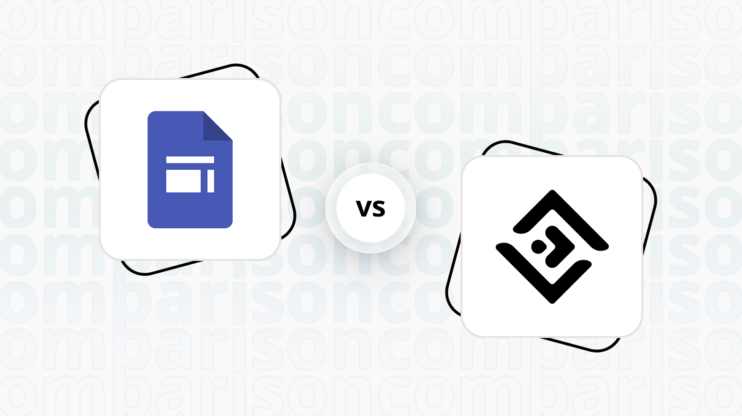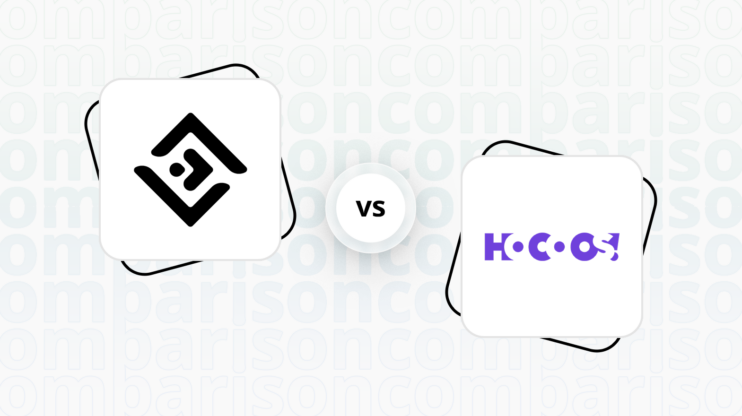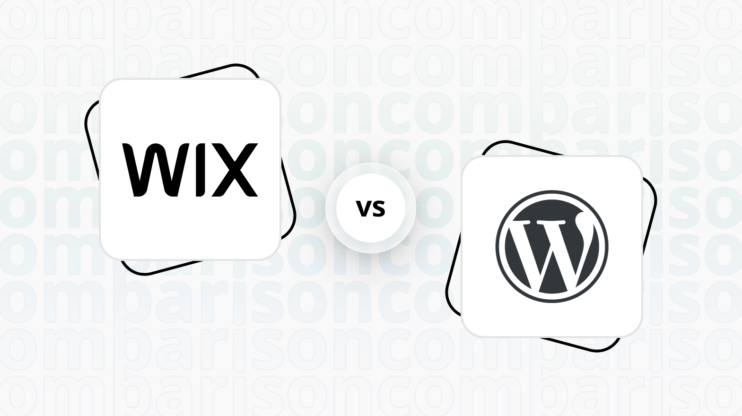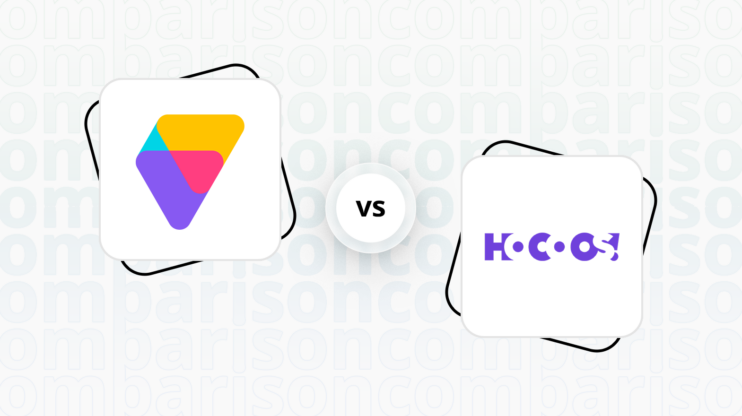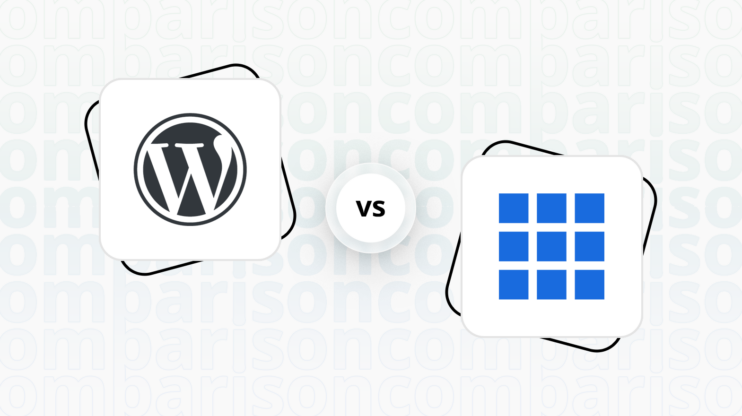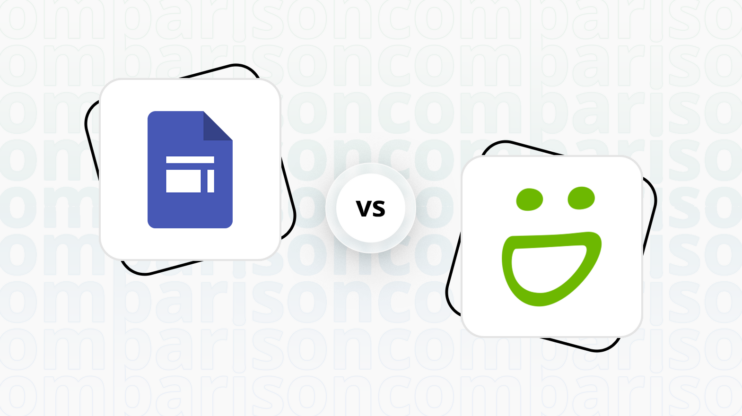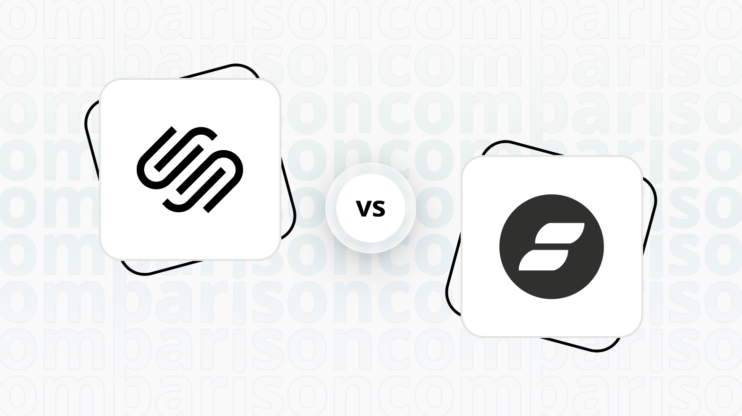Final verdict
Google Sites and Hocoos both offer unique advantages, but they cater to different user needs and preferences.
-
Google Sites (Overall Grade: 5.6/10)
excels in user management, hosting quality, and security, making it a reliable choice for users who prioritize Google integration and collaborative website building. Its strength lies in its seamless integration with Google Workspace, ease of use, and comprehensive customer support. However, it falls short in ecommerce capabilities and AI features compared to Hocoos. -
Hocoos (Overall Grade: 5.6/10)
stands out with its AI-driven design functionalities, superior ecommerce features, and website speed optimization. It is ideal for users looking for a platform that offers creative control, AI content generation, and comprehensive ecommerce solutions. Despite its strengths, Hocoos lacks in hosting transparency, user management flexibility, and has limited user feedback.

|

|
|
|---|---|---|
|
Design functionalities & templates |
4.9 |
7.2 |
|
Ease of use |
8.3 |
8.1 |
|
Ecommerce |
1.8 |
7.4 |
|
Website Editors |
7.0 |
7.7 |
|
Product testing options |
6.9 |
7.5 |
|
Price |
8.1 |
7.8 |
|
Hosting quality |
8.2 |
2.4 |
|
Website speed optimization |
3.3 |
6.2 |
|
Plugins and integrations |
6.4 |
6.3 |
|
Marketing features |
2.6 |
7.0 |
|
Customer support |
7.2 |
3.0 |
|
Security |
9.3 |
4.5 |
|
AI capabilities |
0 |
7.3 |
|
User Management |
7.8 |
0.0 |
| Overall |
5.6 |
5.6 |
Best for ecommerce
 1.8
1.8
 7.4
7.4
Verdict
: For users seeking robust ecommerce capabilities, Hocoos is the clear choice over Google Sites, which lacks built-in ecommerce features.
-
Google Sites
: Best suited for simple websites and projects requiring Google Workspace integration. Its approach to ecommerce relies entirely on third-party tools, making it less ideal for businesses looking to manage an online store directly within their website builder. -
Hocoos
: With a focus on ease of use and comprehensive ecommerce functionalities, Hocoos stands out for businesses of all sizes. Its AI-driven platform offers a wide range of ecommerce features, from product management to payment processing, making it a superior choice for those looking to build and grow their online store.
Best for informational & business websites
 7.2
7.2
 7.4
7.4
Verdict
: Hocoos slightly edges out Google Sites for informational and business websites, offering a more modern and customizable platform.
-
Google Sites
: Known for its simplicity and integration with Google’s ecosystem, Google Sites is a solid choice for creating straightforward informational websites. Its ease of use and collaborative features make it ideal for team projects and small business websites that require basic functionality and seamless Google service integrations. -
Hocoos
: With a slightly higher score and a focus on modern, AI-driven design and customization, Hocoos is better suited for businesses looking for a more dynamic and visually appealing online presence. Its range of templates and AI features provide a more tailored and efficient website building experience.
Detailed comparison
Design functionalities & templates
Design FunctionalitiesRepresents how well each platform allows for creative design and customization of websites.Score Components:
- Template Variety (30%): Range and quality of design templates.
- Customization (30%): Flexibility and options for design alterations.
- User Interface (20%): Ease and intuitiveness of the design process.
- Responsiveness (10%): Adaptability to different devices and screen sizes.
- Innovation (10%): Unique design features and tools.
 4.9
4.9
 7.2
7.2
🏆
Winner: Hocoos.
If you’re looking for a platform that offers more creative control and a wide array of design features, Hocoos is the preferred choice.
Google Sites offers a limited number of templates suitable for various purposes, from personal blogs to business websites, with both free and premium options available. These templates are designed for user engagement, simplicity, and functionality, allowing for customization to meet specific needs.
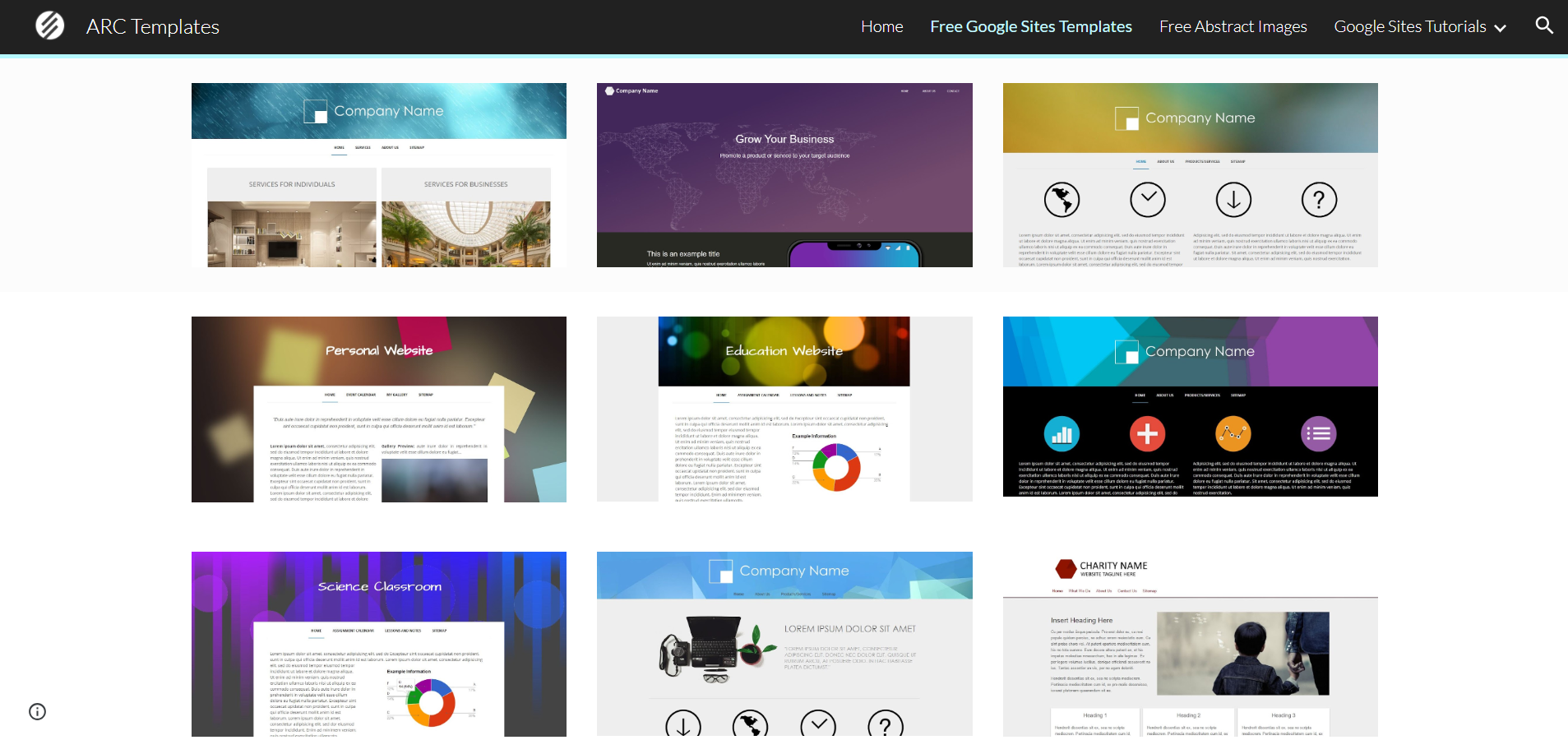

Compared to Google Sites, Hocoos offers a wide variety of templates and designs for their website builder. With over 190 professionally designed templates to choose from, users can easily find a design that suits their needs and preferences. The templates are available for various industries and purposes, including business, ecommerce, portfolio, and more. Additionally, Hocoos regularly updates their template library to ensure that users have access to the latest design trends and styles. Whether you’re a beginner or an experienced web designer, Hocoos provides a range of options to create a visually appealing and functional website.
Get a head start on website creation with AI
Create a custom website tailored to your business needs 10X faster with 10Web AI Website Builder!
Ease of use
Ease of useReflects the platform’s overall user-friendliness.Score
Components:
- Learning curve (40%): Quickness and ease of getting started.
- Interface design (30%): Simplicity and intuitiveness of layout.
- User guidance (20%): Quality of tutorials and support.
- Flexibility (10%): Adaptability to various user skills.
 8.3
8.3
 8.1
8.1
🏆 Winner: Google Sites
. With a score of 8.3, Google Sites edges out Hocoos, which scored 8.1. Google Sites offers a user-friendly interface that integrates seamlessly with other Google services, making it an efficient and straightforward tool for creating basic websites. Hocoos, while also user-friendly, lacks in traditional learning resources, which could be a drawback for some users.
Learning Resources
🏆 Winner: Google Sites
. Google Sites offers a wide array of learning resources, from practical guides for educators to comprehensive digital skill development programs for the wider public. Hocoos, on the other hand, lacks traditional learning resources, focusing more on simplicity and AI content generation.
For ecommerce
EcommerceMeasures the platform’s effectiveness in supporting online business activities.Score Components:
- Ecommerce themes and templates (20%): Variety and design of templates.
- Product management (25%): Ease of managing and organizing products.
- Payment options (25%): Variety and convenience of payment methods.
- Ecommerce features (20%): Features for managing an ecommerce store.
- Integration (10%): Compatibility with external e-commerce tools and services.
 1.8
1.8
 7.4
7.4
When it comes to ecommerce, Hocoos clearly outperforms Google Sites. Google Sites does not have built-in ecommerce features and relies on third-party integrations for ecommerce functionalities. In contrast, Hocoos offers a comprehensive set of ecommerce features, including product and order management, payment processing, shipping and logistics, marketing and SEO, analytics and reporting, and customizability and integrations.

|

|
|
|---|---|---|
|
Ecommerce themes and templates |
0.0 |
6.0 |
|
Product page customization |
0.0 |
7.0 |
|
Payment processing and commissions |
1.0 |
6.5 |
|
POS capabilities |
0.0 |
5.5 |
|
Payment gateways |
2.0 |
7.0 |
|
Product numbers |
0.0 |
6.5 |
|
Additional ecommerce features |
0.5 |
7.0 |
Google Sites ecommerce features:
Google Sites itself does not have built-in eCommerce features. However, you can integrate eCommerce functionalities into a Google Sites website by embedding third-party tools or widgets, linking to an external eCommerce platform, or using buttons that link to payment processors. For instance, you could use Google Forms for order forms and integrate PayPal or another payment service for transactions. To have a full-fledged eCommerce platform with Google Sites, you’d need to rely on these external integrations or services.
Hocoos ecommerce features:
- Product management
- Order management
- Payment processing
- Shipping and Logistics
- Marketing and SEO
- Analytics and reporting
- Customizability and Integrations
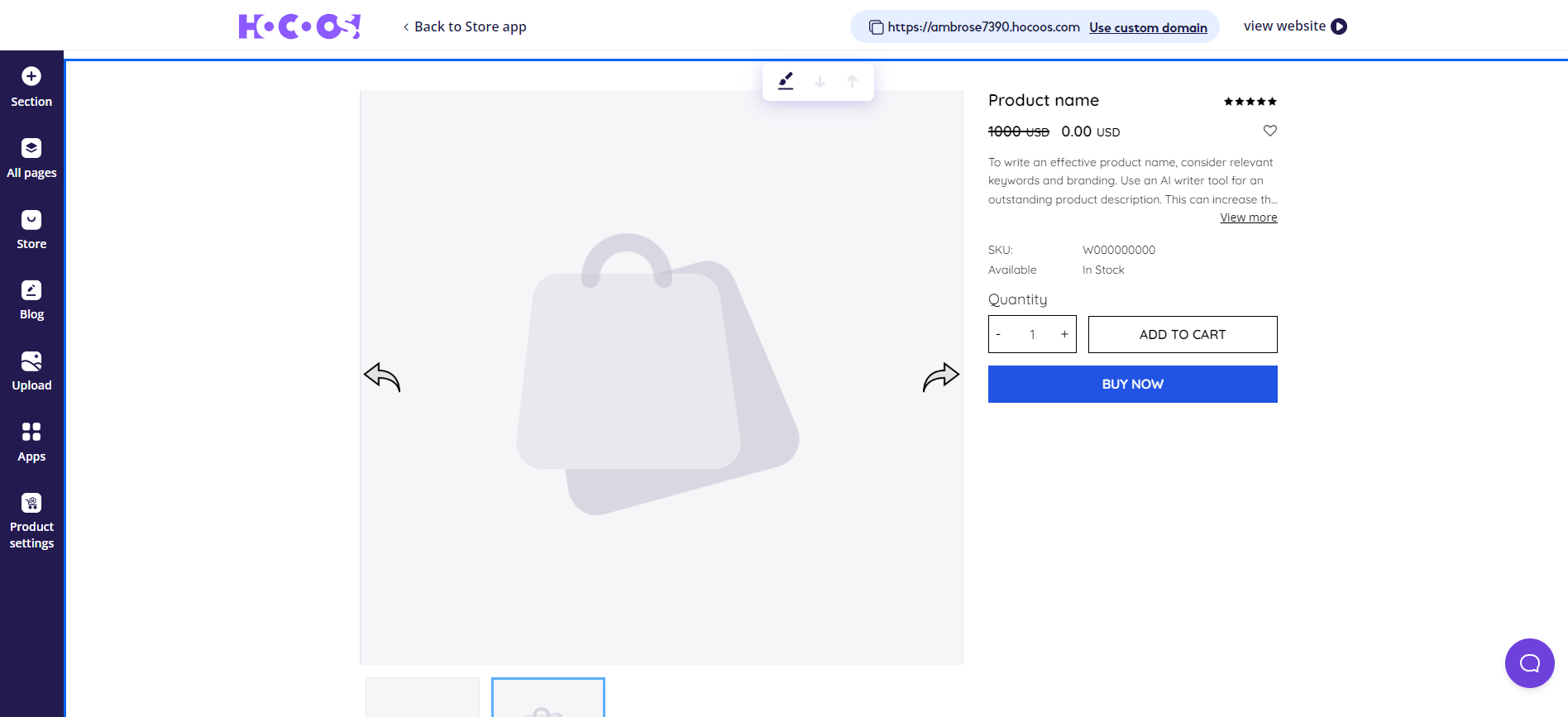
Ecommerce themes & templates
Google Sites does not have any ecommerce templates. On the other hand, Hocoos does not rely on traditional templates for website creation, including ecommerce sites. Instead, it utilizes AI technology to generate unique and customized websites based on the user’s specific inputs.
Product page customization
Google Sites lacks any product page customization features, as the products can be listed with embedding third-party platforms, all the customization can be done within the mentioned platforms. In contrast, Hocoos enables the creation and editing of professional-looking product pages, tailored to enhance the appeal of your products to your target audience, ultimately aiming to boost sales. Additionally, Hocoos allows for easy setup of product variations, including different sizes, colors, or attributes, empowering you to customize offerings, manage pricing, and ensure availability for each variation.
Payment processing
You can integrate payment gateways into Google Sites using external tools or links, not through native features. This can be done by embedding HTML code for payment buttons from services like PayPal, Square, or Stripe, or by linking to an external checkout page. Third-party eCommerce widgets also offer a way to add payment functionalities. However, Google Sites doesn’t offer the comprehensive eCommerce capabilities that dedicated platforms provide. On the other hand, Hocoos simplifies website creation through AI-driven features, offering customizable websites tailored to user preferences. Its platform allows quick website setup by answering a few questions, catering to various business needs such as blogs, online stores, and bookings. Users can personalize their websites using a user-friendly editor for layout, colors, and content. Additionally, Hocoos facilitates online presence with hosting services and integrates payment methods like PayPal and Stripe for seamless management of transactions and inventory.
Website Editors
Website EditorsEvaluates the platforms’ website building and editing capabilities.Score Components:
- Customization tools (40%): Range and power of editing features.
- Editor usability (30%): User experience within the editor.
- Design flexibility (20%): Freedom in layout and design changes.
- Update and maintenance ease (10%): Simplicity of updating and maintaining the site.
 7.0
7.0
 7.7
7.7
🏆
Winner: Hocoos
. Hocoos, with a score of 7.7, is an AI-driven website builder that simplifies the creation of personalized websites through a unique process that requires users to answer eight simple questions. This platform utilizes advanced AI algorithms to automatically generate a custom website tailored to the user’s business needs, including design, content, and images. It features an easy-to-use editor for further customization and offers AI-powered tools for content creation, logo design, and more, making it accessible to users of all technical skill levels.
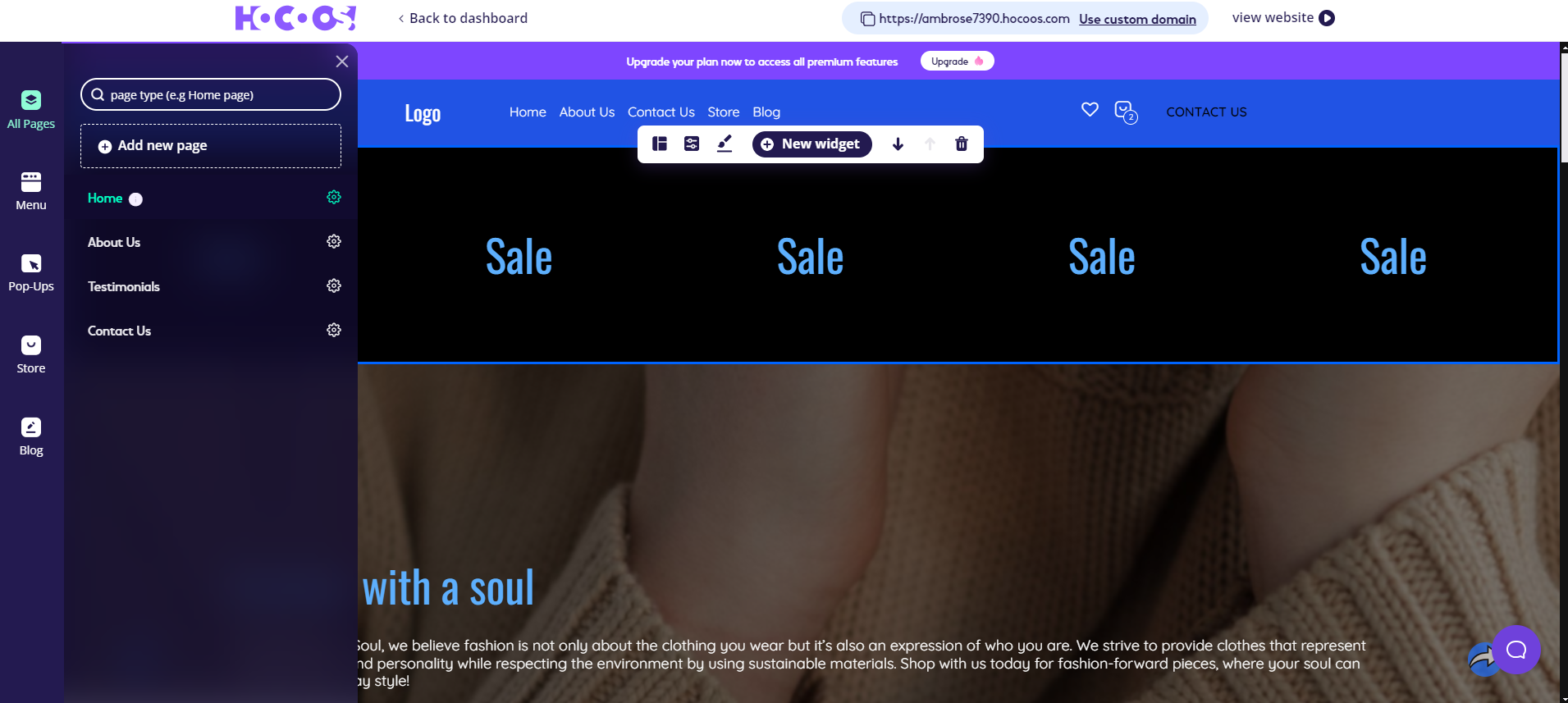
Google Sites, scoring 7.0, offers a user-friendly website builder editor that allows users to create and design websites without needing coding knowledge. With its drag-and-drop interface, users can easily add, customize, and arrange elements such as text, images, and videos on their web pages. It also provides a variety of templates and design options to help users get started quickly and ensure their site looks professional. Additionally, Google Sites integrates seamlessly with other Google services, enabling the incorporation of Google Docs, Sheets, Slides, and Maps directly into the website.
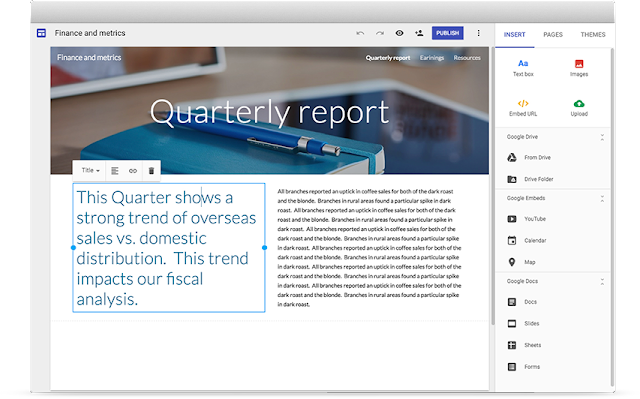
Mobile editor/app
 0
0
 0
0
🏆
Winner: None
. Unfortunately, neither Google Sites nor Hocoos offer a mobile editor or app for managing your website. This means that you will need to use a desktop or laptop computer to create and manage your website on both platforms. While this may not be a problem for some users, it does limit the flexibility and convenience of being able to manage your website on the go. Therefore, if mobile editing is a crucial feature for you, you may want to consider other website builders that offer this capability.
Product testing options
Product Testing OptionsAssesses the options for trying out platform features before commitment.Score Components:
- Trial quality (40%): Extent and usefulness of the trial or free version.
- Feature accessibility (30%): How many features are available to test.
- Trial duration (20%): Length of the trial period.
- Ease of transition (10%): Smoothness of moving from trial to paid plans.
 6.9
6.9
 7.5
7.5
Overall Result
:
Hocoos Wins
. Hocoos scores 7.5, slightly higher than Google Sites’ 6.9. Both Google Sites and Hocoos offer a free version, but Hocoos stands out with its 14-day money-back guarantee, which Google Sites does not provide. While Google Sites allows testing of some premium features during its 14-day free trial, Hocoos offers the possibility to test some features with its free plan.

|

|
|
|---|---|---|
|
Free Plan |
Yes | Yes |
|
Trial Duration |
14 days | No trial |
|
Testing Premium Features |
Some features during free trial | Some features with free plan |
|
Money Back Guarantee |
No | 14 days |
Price
PriceLooks at the cost-effectiveness and value for money of each platform.Score Components:
- Plan value (40%): What each pricing tier offers.
- Transparency and clarity (30%): Clearness of pricing structures.
- Flexibility of plans (20%): Range of options to suit different budgets.
- Hidden costs (10%): Additional expenses not included in the plan.
 8.1
8.1
 7.8
7.8
Google Sites and Hocoos both offer competitive pricing, but Google Sites has a slight edge in terms of value for money.

|

|
|
|---|---|---|
|
Free |
No offering at this amount. |
Free ($0/month): Limited features, ideal for personal projects or trying out the platform. Includes free website hosting, a limited booking system, a blog (without AI blogging), 15 image uploads, and 20 uses of AI content generation. |
|
$0-$10 |
Business Starter ($7.20/month): This plan includes basic features suitable for individuals or small businesses, offering professional email through Gmail, 30GB of storage per user, and video meetings for up to 100 participants. It allows to manage 1 website and there is no limitation on number of pages. Value for price: 6.0 |
No offering at this amount. |
|
$10-$20 |
Business Standard ($14.40/month): Suitable for growing businesses, this plan provides 2 TB of storage per user, video meeting capacity for up to 150 participants with recording features, and access to smart booking pages and shared drives. It allows to manage 1 website and there is no limitation on number of pages. Value for price: 7.5 |
Premium ($15/month): All features, including a free custom domain name, online payments, 600,000+ stock images, marketing integrations, unlimited image uploads, unlimited AI features, a custom email address, and email marketing. Value for price: 9.0 |
|
$20+ |
Business Plus ($21.60/month): Designed for larger businesses needing more robust capabilities, offering 5 TB of storage per user, advanced security options, and video meetings for up to 500 participants. It allows to manage 1 website and there is no limitation on number of pages. Value for price: 8.5 |
No offering at this amount. |
location. As a result in rare cases the prices displayed here can differ from the ones you see on their
websites.
Hosting quality
Hosting
qualityExamines the reliability and performance of the hosting solutions.Score Components:
- Uptime (40%): Consistency and reliability of website availability.
- Speed (30%): Loading times and performance.
- Bandwidth and storage (20%): Sufficiency of resources provided.
- Data centers (10%): Quality and distribution of hosting infrastructure.
 8.2
8.2
 2.4
2.4
🏆
Winner: Google Sites
Google Sites offers reliable cloud-based managed hosting with a 99.9% uptime guarantee and a vast network of 21 global data centers. It provides basic storage with the option to upgrade for more space. Hocoos, on the other hand, lacks transparency in its hosting details, including uptime statistics and data center information, which significantly impacts its hosting quality rating.

|

|
|
|---|---|---|
|
Do they offer hosting? |
Yes, included in all plans |
Yes, included in all plans |
|
Data Centers: |
Google operates a total of 21 data centers across the globe: 2 in Asia, 5 in Europe, 13 in US and 1 in South America |
Hocoos does not provide any information about its data centers |
|
Type of hosting: |
Cloud based managed hosting |
Hocoos does not specify the type of hosting |
|
Uptime: |
99.9% |
Hocoos does not provide uptime statistics |
|
Uptime Guarantee: |
Yes, 99.9% |
No |
Website Speed Optimization
Website Speed OptimizationEvaluates optimization of website loading timesScore Components:
- PageSpeed Score (30%): Google’s score indicating performance optimization.
- Loading Time (30%): The average time until a website is fully interactive.
- Mobile Optimization (15%): Optimization effectiveness for mobile devices.
- Resource Optimization (15%): Optimizing images, scripts, and other heavy resources.
- CDN Usage (10%): Use of CDN to enhance speed across geolocations.
 3.3
3.3
 6.2
6.2
🏆 Winner: Hocoos
Both Google Sites and Hocoos prioritize website performance and page speed, but Hocoos has a higher website speed optimization score.

|

|
|
|---|---|---|
|
Focus |
Automated Optimization, CDN, Mobile Optimization, Browser Caching, Code Minification, Use of AMP |
CDN, Minimization of HTTP Requests, Caching |
|
Performance Tools |
Google Lighthouse, PageSpeed Insights |
Google PageSpeed Insights Integration |
|
Key Strategies |
Automated Optimization, CDN, Mobile Optimization, Browser Caching, Code Minification, Use of AMP |
CDN, Minimization of HTTP Requests, Caching |
|
Load Times |
Not disclosed by Google |
Varies widely, depending on the optimization and user’s location |
|
Page Speed Scores Range |
Not disclosed by Google |
Varies widely, depending on the optimization and user’s location |
|
Core Web Vitals Improvement |
Emphasis on LCP, FID, CLS improvements |
No information available |
Google Sites, a structured web page-creation tool included in the Google Workspace package, emphasizes automated optimization, CDN, mobile optimization, browser caching, code minification, and the use of AMP for website speed optimization. However, Google does not disclose statistics about website Page Speed scores or load times. Google Sites also focuses on improving Core Web Vitals, specifically LCP, FID, and CLS.
On the other hand, Hocoos, an AI website builder and hosting platform, prioritizes CDN, minimization of HTTP requests, and caching for website speed optimization. The load times and Page Speed scores of Hocoos websites vary widely, depending on the optimization and the user’s location. However, there is no information available about Hocoos’ improvements in Core Web Vitals. Despite this, Hocoos has a higher website speed optimization score than Google Sites, making it the winner in this category.
Get a head start on website creation with AI
Create a custom website tailored to your business needs 10X faster with 10Web AI Website Builder!
Plugins and integrations
Plugins and integrationsMeasures the range and effectiveness of additional plugins and integrations.Score Components:
- Variety of options (40%): Range of available add-ons.
- Integration smoothness (30%): Ease of integrating plugins into the site.
- Quality of plugins (20%): Functionality and reliability of the options.
- Custom integration capabilities (10%): Support for custom or third-party integrations.
 6.4
6.4
 6.3
6.3
🏆 Winner: Google Sites.
Google Sites scores 6.4, slightly edging out Hocoos with a score of 6.3. Google Sites offers a wide array of plugins and extensions to enhance website functionality, catering to various needs such as social media integration, e-commerce, chats, forms, video, audio, and more. Hocoos also offers a wide range of plugins and extensions, but Google Sites’ integration with Google services gives it a slight advantage.

Marketing Features
Marketing featuresAssesses tools and options available for marketing.Score Components:
- SEO tools (40%): Effectiveness of SEO features.
- Marketing automation (30%): Availability and quality of marketing tools.
- Social Media integration (20%): Ease and depth of social media connectivity.
- Email marketing (10%): Quality and usability of email marketing tools.
 2.6
2.6
 7.0
7.0
🏆
Overall Winner: Hocoos
. Hocoos offers a more comprehensive set of marketing features, including email marketing, blogging, and ads and promotions. Google Sites, while offering basic SEO and analytics, lacks in areas like email marketing and blogging.

|

|
|
|---|---|---|
|
SEO Tools |
Basic SEO settings | Comprehensive SEO tools |
|
Email Marketing |
No | Yes, on premium plan |
|
Blogging |
No | Yes |
|
Social Media Integration |
Basic integration through links and widgets | Easy integration with various platforms |
|
Analytics and Reporting |
Google Analytics integration | Google Analytics integration |
|
Ads and Promotions |
No | Yes, with third-party platforms |
Customer Support
Customer supportEvaluates the quality and availability of support options.Score Components:
- Response time (40%): Speed of support responses.
- Support quality (30%): Effectiveness and helpfulness of the support.
- Availability (20%): Range of support channels (phone, chat, email).
- Resource richness (10%): Quality of self-help and educational materials.
 7.2
7.2
 3.0
3.0
🏆 Winner: Google Sites
. Google Sites offers a more comprehensive customer support system compared to Hocoos. Google Sites provides self-service resources, direct support for Google Workspace customers, and 24/7 support for critical issues. This makes it easier for users to get the help they need when they encounter problems.
On the other hand, Hocoos does not provide detailed information about their customer support. They emphasize that their customer support is 100% human, indicating a commitment to providing personal assistance. However, they do not offer enterprise support, which could be a disadvantage for larger businesses.
Security
SecurityLooks at the platforms’ security measures and data protection.Score Components:
- Data protection (40%): Safeguards for user and customer data.
- SSL and encryption (30%): Implementation of secure connections.
- Compliance (20%): Adherence to industry security standards.
- Regular updates (10%): Frequency of security updates and patches.
 9.3
9.3
 4.5
4.5
🏆
Winner: Google Sites
. Google Sites, with a security score of 9.3, offers robust security measures including SSL encryption, two-factor authentication, and automatic malware scanning. It also benefits from Google’s regular security updates, strict access controls, and compliance with international data protection standards. Google’s infrastructure provides DDoS protection and data redundancy, ensuring a secure environment for website creators and visitors.
Although it may not offer the same level of specialized security features as Google Sites, Hocoos, with a security score of 4.5, emphasizes security for websites built with its platform, integrating advanced encryption protocols and providing regular security updates. However, it does not provide specific information regarding its security measures for website security. Despite this, its reliance on AI suggests the use of advanced encryption for their platform.
AI Capabilities
AI capabilitiesMeasures the effectiveness of AI-driven features and tools.Score Components:
- Automation efficiency (40%): Impact of AI on streamlining processes.
- Personalization (30%): AI-driven customization for users or customers.
- AI-Assisted design (20%): Role of AI in website design and functionality.
- Data analysis (10%): Use of AI in interpreting user data and analytics.
 0
0
 7.3
7.3

|

|
|
|---|---|---|
|
AI Website Builder |
|
Hocoos offers an AI website builder |
|
AI Ecommerce Features |
|
Hocoos leverages AI for ecommerce |
|
AI Content Generation |
|
Hocoos has AI content generation features |
|
Additional AI Features |
|
Hocoos enhances website creation with AI-powered features |
🏆 Winner: Hocoos
. Hocoos, with a score of 7.3, offers a range of AI capabilities including an AI website builder, AI ecommerce features, AI content generation, and additional AI features. These features help users to quickly turn ideas into reality, improve the ecommerce experience, generate high-quality written material, and enhance website creation.
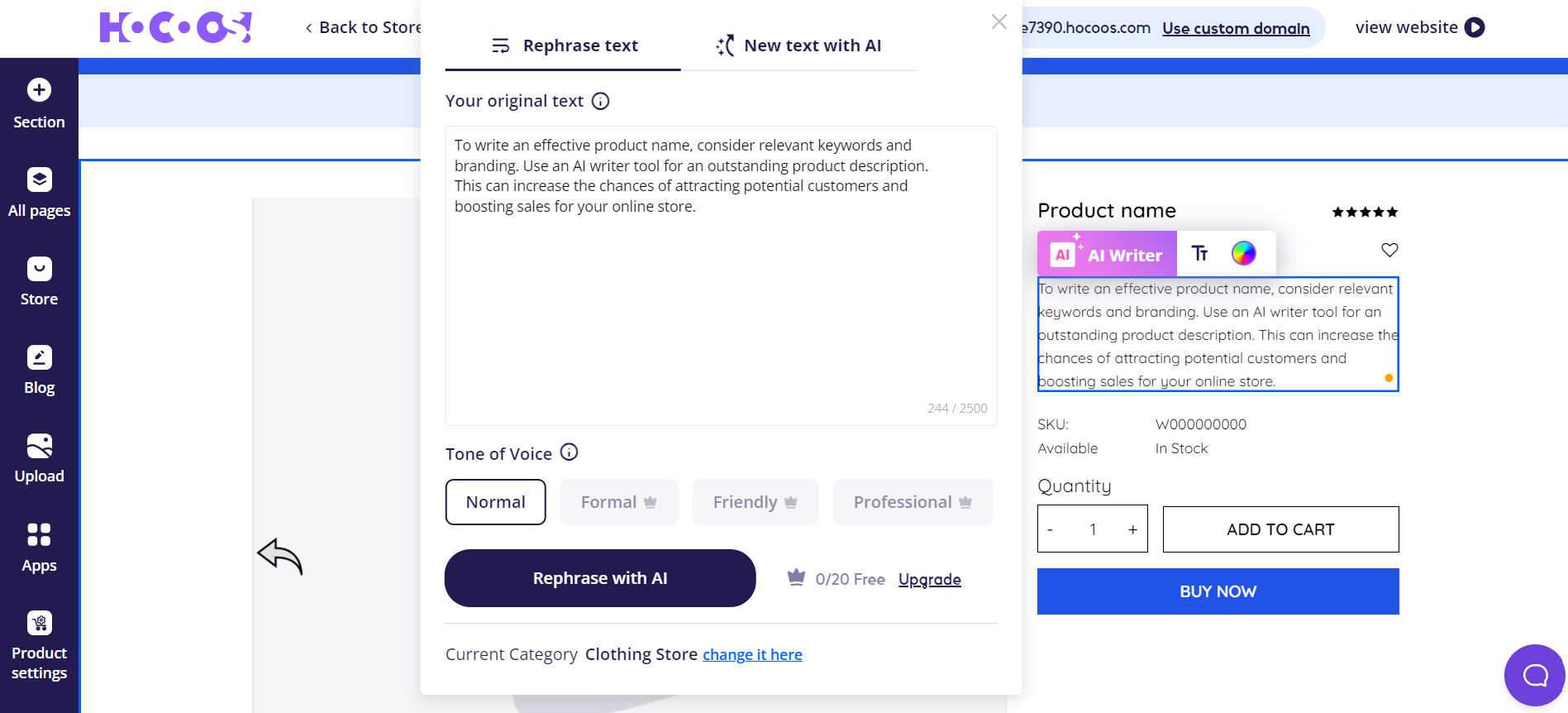
Google Sites, on the other hand, does not have any AI capabilities. Therefore, it does not score in this category.
User Management
User ManagementAssesses the platforms’ capabilities in managing user roles, permissions, and accessibility.Score Components:
- Role Customization (40%): Flexibility in creating and defining user roles and
permissions. - Ease of Management (30%): User interface and tools for managing users.
- Access Control (20%): Effectiveness of access control measures for different user
levels. - Scalability (10%): Ability to manage a growing number of users efficiently.
 7.8
7.8
 0.0
0.0
🏆 Winner: Google Sites
. Google Sites and Hocoos have different approaches to user management.
- Google Sites allows multiple users to collaborate with different roles, including Owners, who have full control, and Editors, who can modify content but not site settings. There’s no strict limit on the number of users who can edit a site, allowing flexibility in management and development. Viewers can only see the site, with no editing permissions. This structure supports collaborative website building with varied levels of access and control for different users.
- Hocoos does not allow to have multiple users for editing your website.
Additional Features

|

|
|
|---|---|---|
|
SSL Certificate |
|
|
|
Custom Domain |
|
|
|
Free Custom Domain Included |
|
|
|
International Domains |
|
|
|
Mobile Responsive |
|
|
|
Page Speed |
|
|
|
Website Builder Mobile App |
|
|
|
Convert a Website To An App |
|
|
|
Website Analytics |
|
|
|
Multilingual Sites |
|
|
|
Multiple Users |
|
|
User Feedback
Users consistently praise Google Workspace, particularly Google Sites, for its seamless integration, ease of use, and collaborative features, making it a go-to solution for various professional and educational needs. The platform’s simplicity and user-friendly interface are lauded, enabling effortless website creation and sharing of information within organizations. While some users desire more customization options and additional features, overall, Google Workspace remains highly valued for its versatility and streamlined workflow facilitation.
Hocoos, on the other hand, does not have any reviews on G2, indicating a lack of user feedback for this platform.
The making of this blog
We followed a clear, step-by-step process to write and research this article.
FAQ
Which platform is better for ecommerce, Google Sites or Hocoos?
Can I use Google Sites and Hocoos for creating informational business websites?
How do Google Sites and Hocoos compare in terms of design functionalities and templates?
Which platform is easier to use, Google Sites or Hocoos?
What are the main differences in hosting quality between Google Sites and Hocoos?
Which platform offers better website speed optimization, Google Sites or Hocoos?
How do Google Sites and Hocoos compare in terms of AI capabilities?
Which platform provides better customer support, Google Sites or Hocoos?
Are there any differences in security measures between Google Sites and Hocoos?










